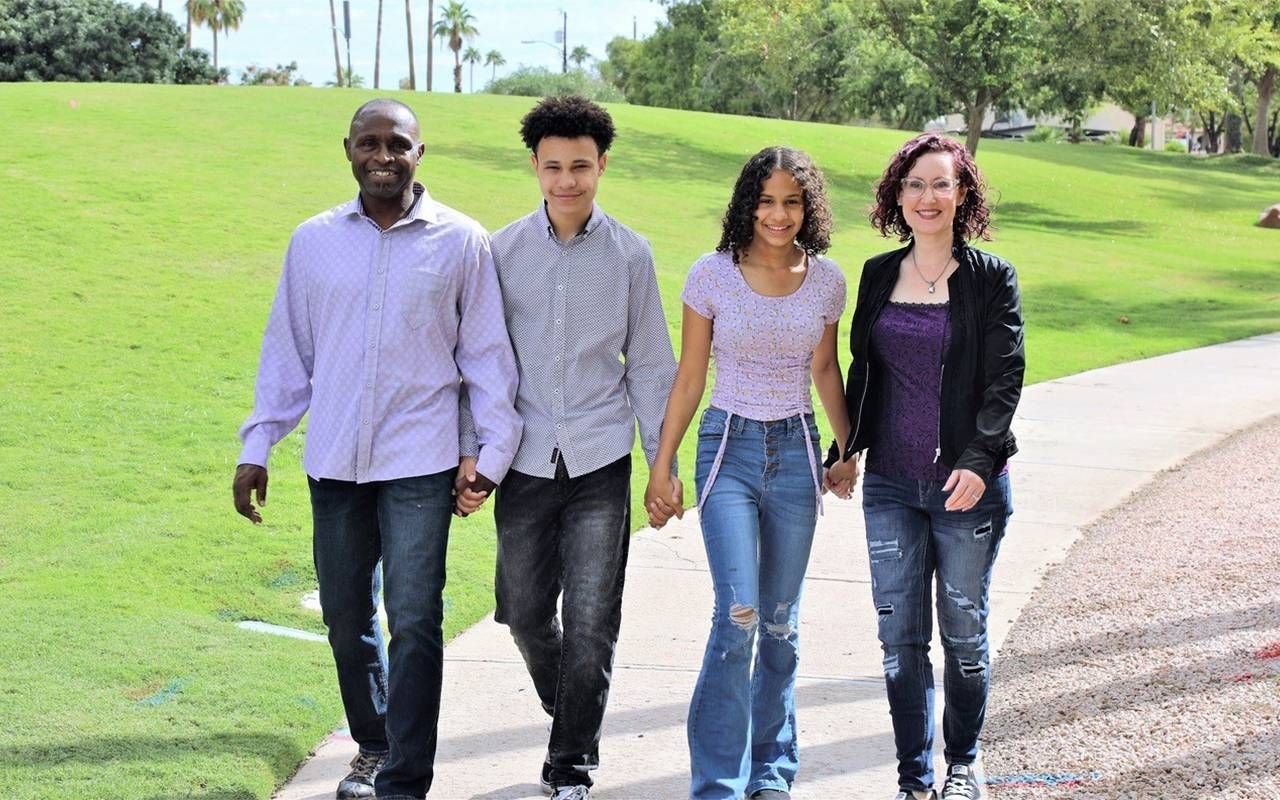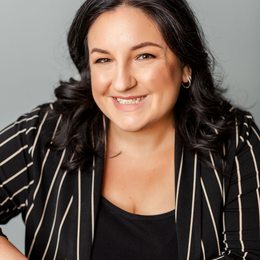Turning Surviving Into Thriving: One Chronic Kidney Disease Patient's Story
Raymond Scott and his family want to spread awareness of the disease and its often undetected impact
The National Kidney Foundation defines kidney disease as "the underrecognized public health crisis." According to recent research, kidney disease impacts an estimated 37 million people in the U.S. (15% of the adult population). Yet, an astounding 90% of those with kidney disease are unaware they have it. This lack of knowledge can lead to life-altering consequences.

"The first time I learned I had kidney disease was the same day that my kidneys failed," said Raymond Scott, 54, an Arizona resident and co-founder of 1in9 Charities, Inc.
"I 'crashed' into dialysis — meaning I started treatment without planning or expecting to — nearly 25 years ago at the age of 29 due to high blood pressure."
The Danger of Chronic Kidney Disease
"Chronic Kidney Disease (CKD) means your kidneys are damaged and losing their ability to keep you healthy by filtering your blood," according to the National Kidney Foundation. "In the early stages of the disease, most people do not have symptoms. But as kidney disease worsens, wastes can build up in your blood and make you feel sick."
As reported by the Centers for Disease Control and Prevention (CDC), some of the health issues associated with CKD include:
- Anemia or a low number of red blood cells
- Increased occurrence of infections
- Low calcium levels, high potassium levels, and high phosphorus levels in the blood
- Loss of appetite or eating less
- Depression or lower quality of life
Kidney disease has varying levels of seriousness; if left untreated, it can progress to kidney failure and cardiovascular disease. According to the CDC: "When the kidneys stop working, dialysis or kidney transplant is needed for survival. Kidney failure treated with dialysis or kidney transplant is called end-stage renal disease (ESRD)."
Raymond Scott's Kidney Disease Journey
Raymond Scott is one of the kidney disease patients that needed dialysis to survive. In 1998, when he began dialysis, he learned that the average person on dialysis has a 5-to-10-year life expectancy.
Looking back, he says he is grateful he could complete dialysis treatments from home using peritoneal dialysis. Then, in 2001, his brother donated a kidney that lasted for five years.
"For five years, I lived with a healthy kidney, providing me with a great quality of life," he said. "My transplanted kidney failed in 2006, so I restarted dialysis, going in-center three days a week to receive hemodialysis treatment for a few hours each visit. Although the treatment was life-sustaining, it left me drained and exhausted."
In 2012, Raymond could transition from in-home treatments to home hemodialysis. "Dialyzing from home allows me to set and manage my treatment schedule, which Analyn [his wife] administers for me five days a week," he explained.
"Because I dialyze more frequently, it's less stressful on my heart, and I have much more energy, stamina, and freedom – enhancing my quality of life."
"From day one, Raymond and I linked arms, and no matter what we were facing, we continued to put one foot in front of the other."
Raymond and Analyn had been dating for only three months after his kidneys failed in 1998. "He was 29, and I was 23, and neither one of us had any prior knowledge or experience with kidney disease, let alone kidney failure and dialysis," Analyn said.
"A week later, as I drove Raymond back to his apartment from the hospital, he told me he would move back home to Charleston. He knew he had a long road ahead of him and said it wouldn't be fair to me," she recalled. "I told him that he was a good man, but he wasn't going anywhere, and I wasn't going to leave him just because his kidneys failed, so we should see where our relationship would go …We were married less than a year later."
The pair now have two teenagers, Kenyon, 17, and Brooklyn, 14, and believe the experience of kidney disease — while challenging — has brought them closer together as a family.
"I consider myself more of a care partner and advocate than a caregiver," Analyn said. "From day one, Raymond and I linked arms, and no matter what we were facing, we continued to put one foot in front of the other."
She added, "Raymond's first term of endearment for me is 'babe.' Still, his second is 'Bulldog,' which I wear with pride because I've been his biggest advocate throughout the years, especially when he faced medical emergencies and was less able to speak for himself."
Today, Raymond and his family are living life with gratitude he says he wouldn't have otherwise.
"I realized a long time ago that if I didn't take charge of this disease, it would take charge of me, so I became more disciplined in my eating habits and exercise routine to buy back some of the years this disease has taken from me," he said.
"Whenever I don't feel like working out, I look at my wife and kids to remind me of my commitments to them, not just to live a long life, but to thrive. So I will teach my son to shave, walk my daughter down the aisle, dance with her at her wedding, spoil my future grandchildren, and still chase my wife around the house when we're in our eighties," he said.
Advocating and Raising Awareness to Help Others with CKD
Inspired by the work of the National Kidney Foundation of Arizona, in 2016, Raymond was the first patient actively on dialysis to be a dancer at the nonprofit's annual "Dancing with the Stars" fundraiser gala. Analyn says he danced on stage precisely 18 years to the day when his kidneys originally failed.
"That experience was the catalyst for us to fulfill our purpose and destiny and create 1in9 Charities, Inc. to change the trajectory of kidney disease and save millions of lives by educating, empowering, and giving hope to people across the U.S. and the world," Analyn said.
Awareness, prevention, and early detection are key to kidney and overall health.
In 2017, the Scott family traveled around the country — dialysis machine and supplies in hand — to produce a documentary on their experience. They have also published a book and recently launched a podcast, among other initiatives.
"We want people to be in the know and be their own biggest advocate," Analyn said about the goal of their advocacy work. "Awareness, prevention, and early detection are key to kidney and overall health. As more kidney disease warriors and advocates join us in this fight, we can change the outcome of these projections if we take serious action now."
Kidney Disease and Its Impact on People of Color
According to the National Institute of Diabetes and Digestive and Kidney Diseases, African Americans are almost four times as likely as whites to develop kidney failure. In addition, while African Americans comprise about 13% of the population, they account for 35% of those with kidney failure in the United States.
"As a clinical researcher and a nephrologist, I have seen this disparity firsthand," said Dr. Nwamaka (Amaka) Eneanya, head of strategy and operations for Fresenius Medical Care's Global Medical Office.
"ESRD risk factors, including diabetes and high blood pressure, are more prominent among Black individuals due to the impact of structural racism," Eneanya said.
"Structural racism results in individuals having less access to determinants of health, including high quality and affordable foods, safe housing, and affordable health care. Some Black individuals are more likely to develop or have poor control of ESRD risk factors without these necessities."
"Discrimination, or unjust treatment based on certain demographic factors like race and ethnicity, also contributes to disparities in the development of kidney disease and associated outcomes."
"Discrimination, or unjust treatment based on certain demographic factors like race and ethnicity, also contributes to disparities in the development of kidney disease and associated outcomes."
While there is compelling evidence for genetic contribution across different forms of kidney disease, more research is needed to understand the causes of kidney disease better, Eneanya said.
"I'm energized by programs like Fresenius Medical Care's new genomic registry," she added. "Built for CKD patients of all ethnic and cultural backgrounds, the registry seeks to unlock a wealth of data that will ultimately help the nephrology community uncover genetic causes of kidney disease and lead to cutting-edge treatments."
As the health care community works to identify ways to address the disproportionate impact of kidney disease on communities of color, Eneanya stresses the importance of self-advocacy and being engaged to improve one's health.
She encourages those who suspect any health abnormalities to seek medical care.
"You should talk to your doctor immediately if you notice changes in urination, fatigue, high blood pressure, itching, or swelling in your hands, legs, or feet. Shortness of breath, pain in the small of your back, decreased appetite, puffiness around your eyes, and abnormal levels of phosphorous, calcium, or vitamin D can also be symptoms of CKD," she explained.
"Early detection is critical. Your primary care doctor can help you determine when it's time to see a kidney doctor (nephrologist) who specializes in treating kidney disease."
Eneanya also believes that improving diversity and inclusion in research "is crucial to advancing science that will apply more equitably to patients at risk for chronic diseases."
Raymond Scott is intent upon increasing awareness about kidney disease. "I want [people]to know that kidney disease and kidney failure doesn't have to be a death sentence like many people think," he said. "I want them to know that they have treatment options based on their needs, and their strength can be an inspiration to others."


